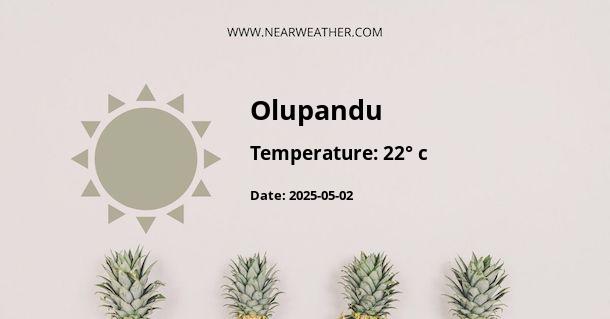Olupandu, located in the heart of Namibia, experiences a unique and diverse climate throughout the year. Understanding the weather patterns in Olupandu is crucial for residents, visitors, and outdoor enthusiasts. From temperature fluctuations to precipitation levels, the climate in Olupandu has a significant impact on daily life and seasonal activities. Let's delve into the comprehensive overview of the climate and weather patterns in Olupandu, Namibia, throughout the year.
Annual Weather Overview in Olupandu
When exploring the climate of Olupandu, it is essential to consider the overall annual weather patterns. The region experiences a semi-arid climate characterized by distinct wet and dry seasons. The temperature variations, precipitation levels, and prevailing winds play a pivotal role in shaping the climate throughout the year.Temperature Range
The average annual temperature in Olupandu typically ranges between 20°C to 34°C (68°F to 93°F). The hottest months in Olupandu are generally from October to March, with average temperatures reaching approximately 34°C (93°F), making it essential for residents and visitors to prepare for the high heat during these months. In contrast, the coolest months occur from June to August, with average temperatures hovering around 20°C (68°F).Precipitation Levels
Olupandu experiences a distinct wet season from November to April, with the majority of the annual rainfall occurring during these months. The average annual precipitation in Olupandu ranges from 300mm to 500mm (11.8 inches to 19.7 inches), with the peak of rainfall typically observed in January and February. Conversely, the dry season spans from May to October, with significantly reduced precipitation levels during these months.Wind Patterns
The prevailing wind patterns in Olupandu play a crucial role in shaping the local climate. During the dry season, the region experiences dry and dusty winds, contributing to arid conditions. In contrast, the wet season brings relief in the form of cooler and more humid winds, providing a reprieve from the aridity.Seasonal Weather Variations
Understanding the seasonal weather variations in Olupandu is vital for planning various outdoor activities and agricultural practices. The distinct changes in temperature, precipitation, and natural phenomena characterize each season in Olupandu.Summer (November to March)
Summer in Olupandu is marked by high temperatures and increased humidity. The average maximum temperature during these months ranges from 30°C to 34°C (86°F to 93°F), creating hot and arid conditions. The peak of the wet season occurs during the summer months, with frequent afternoon thunderstorms bringing much-needed rainfall to the region.Autumn (April to May)
As the wet season transitions into the dry season, autumn in Olupandu experiences a gradual decrease in temperatures. The average maximum temperature during this period ranges from 28°C to 32°C (82°F to 89°F). The sporadic rainfall diminishes, signaling the onset of drier conditions.Winter (June to August)
Winter in Olupandu is characterized by cooler temperatures and clear skies. The average maximum temperature during these months ranges from 20°C to 24°C (68°F to 75°F), creating a noticeable drop in temperature compared to the summer months. The absence of significant rainfall contributes to the dry and arid conditions prevalent during winter.Spring (September to October)
As Olupandu transitions from winter to summer, spring brings a gradual increase in temperatures. The average maximum temperature during this period ranges from 25°C to 30°C (77°F to 86°F). The onset of sporadic rainfall marks the transition from the dry season to the upcoming wet season.Extreme Weather Events and Natural Phenomena
Olupandu, like many regions, is susceptible to extreme weather events and natural phenomena that significantly impact the local climate. From heat waves to occasional flooding, understanding these occurrences is crucial for preparedness and safety.Heat Waves
During the peak of summer, Olupandu may experience heat waves, resulting in exceptionally high temperatures that can pose health risks to residents and visitors. It is essential to take appropriate measures to stay cool and hydrated during these extreme heat events.Flooding
The wet season in Olupandu brings the potential for localized flooding, particularly in low-lying areas. The heavy rainfall, combined with the topography of the region, can lead to temporary flooding. Residents and visitors should remain vigilant and informed about any potential flood warnings during the wet season.Sandstorms
The dry and dusty winds during the dry season may lead to occasional sandstorms in Olupandu. These natural phenomena can significantly reduce visibility and impact outdoor activities. Staying informed about weather forecasts and taking precautions during sandstorms is crucial for safety.Conclusion
In conclusion, Olupandu's climate showcases a fascinating interplay of temperature fluctuations, precipitation patterns, and natural phenomena throughout the year. From the scorching heat of summer to the cooler temperatures of winter, the climate in Olupandu shapes daily life and environmental conditions. Understanding these weather patterns is essential for residents, visitors, and those with a keen interest in the dynamic climate of Namibia. By providing a comprehensive overview of the climate and weather patterns in Olupandu, this guide aims to offer valuable insights into the diverse and captivating climate of this region in Namibia.A - Olupandu's Latitude is -17.566669 & Longitude is 15.583330.
A - Weather in Olupandu is 30° today.
A - Climate Conditions in Olupandu shows broken clouds today.
A - Humidity in Olupandu is 45% today.
A - Wind speed in Olupandu is 18.9 km/h, flowing at 48° wind direction. today.
